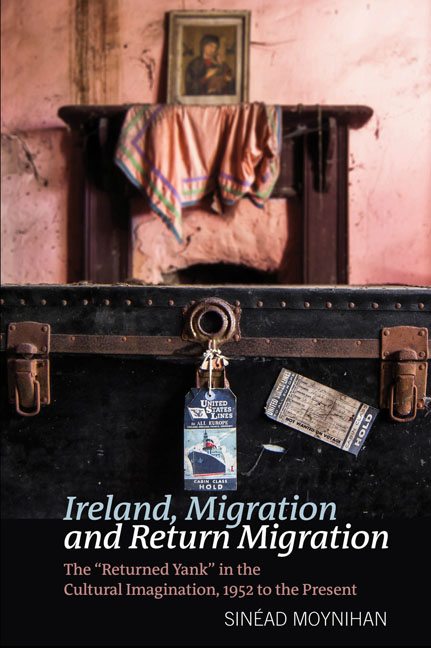 Ireland, Migration and Return Migration
Ireland, Migration and Return Migration Book contents
- Frontmatter
- Contents
- List of Figures
- Acknowledgements
- Introduction: ‘The Meanest Form of Animal’? The Returned Yank in the Cultural Imagination
- 1 ‘Quiet Men’: Film and Filmmaking in Returned Yank Fictions of the Troubles
- 2 ‘Mother Macree ad nauseam’: Maternity, Modernity and the Female Returned Yank
- 3 Erin’s Acres: The Returned Yank, Property Disputes and the Rise and Fall of the Irish Economy
- 4 ‘The Secret Dotted Line’: Return, Roots Journeys and Irish Literary Genealogies
- Coda: ‘We Are Where We Are’: Mythologies of Return and the Post-Celtic Tiger Moment
- Works Cited
- Index
2 - ‘Mother Macree ad nauseam’: Maternity, Modernity and the Female Returned Yank
- Frontmatter
- Contents
- List of Figures
- Acknowledgements
- Introduction: ‘The Meanest Form of Animal’? The Returned Yank in the Cultural Imagination
- 1 ‘Quiet Men’: Film and Filmmaking in Returned Yank Fictions of the Troubles
- 2 ‘Mother Macree ad nauseam’: Maternity, Modernity and the Female Returned Yank
- 3 Erin’s Acres: The Returned Yank, Property Disputes and the Rise and Fall of the Irish Economy
- 4 ‘The Secret Dotted Line’: Return, Roots Journeys and Irish Literary Genealogies
- Coda: ‘We Are Where We Are’: Mythologies of Return and the Post-Celtic Tiger Moment
- Works Cited
- Index
Summary
I have many complex and vacillating feelings about Ireland: an umbilical cord coupled with fury over its doctrinaire attitudes.
Edna O’Brien, Interview with Ken Adachi (1988)The lull of Eden, of ancient perfection. Had this been her destination all along, this return to the source, the starting point, the only place she had ever belonged?
Mary Costello, Academy Street (2014) 177In Edna O’Brien's ‘Savages,’ first published in the New Yorker in January 1982, the narrator is fascinated by the daughter of her neighbours, Mabel McCann, who returns to her home in the west of Ireland having lived in Australia for ten years. From the moment of her return, she is widely perceived as a disruptive presence. Lacking glamour or style, she fails to live up to the community's expectations of a returnee. The men ‘who had come to vet her agreed that she wasn't worth tuppence’ and the women ‘were most disappointed by her attire.’ After engaging in a brief affair with a returnee from Canada, the extent of which is that ‘they went behind the tent’ on the last night of the village carnival (FH 88), Mabel appears to grow stout. Her neighbours speculate (and a local midwife subsequently confirms) that she is pregnant. After a mysterious figure (an abortionist? a healer?) is invited into the McCann home, but fails to ‘cure’ Mabel, her mother has no choice but to tell her father, who will only be dissuaded from going to Mabel's room ‘in order to kill her’ when he is told that his daughter was ‘molested by a stranger’ (93). Shunned ‘at Mass, shunned on her way down from Mass, and avoided when she went into the shops’ (91), Mabel is also the unnamed target of a priest's ‘lurid sermon about impurity’ (91–92). The locals are shocked by Mabel's lack of shame about her pregnancy; she responds to one inquiry as to the identity of the baby's father: ‘Your guess is as good as mine’ (91). When Mabel apparently goes into labour, the doctor is summoned, only for him to announce that Mabel is ‘no more pregnant than [he is]’ (94).
- Type
- Chapter
- Information
- Ireland, Migration and Return MigrationThe 'Returned Yank' in the Cultural Imagination, 1952 to the present, pp. 85 - 130Publisher: Liverpool University PressPrint publication year: 2019


